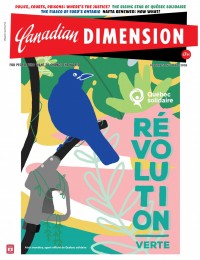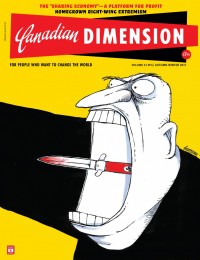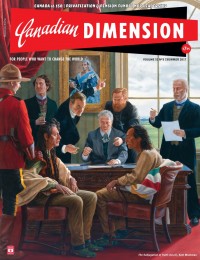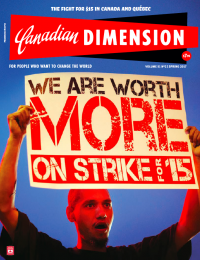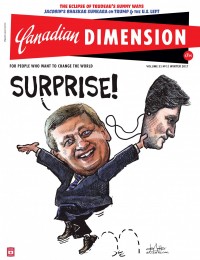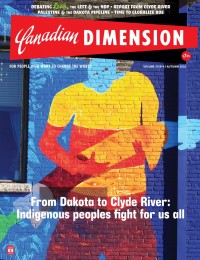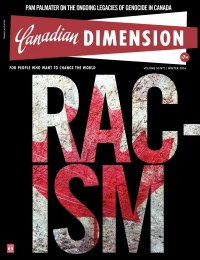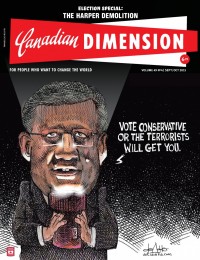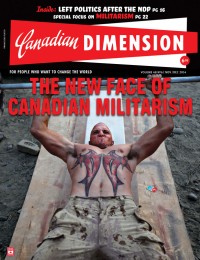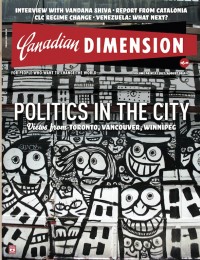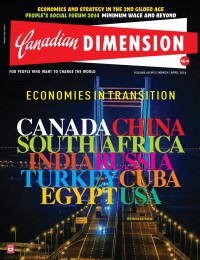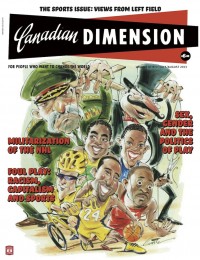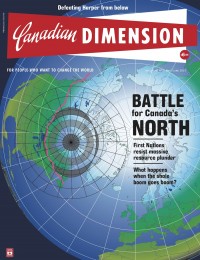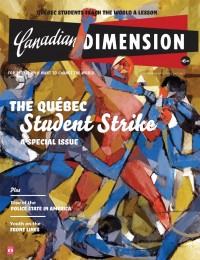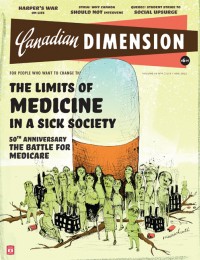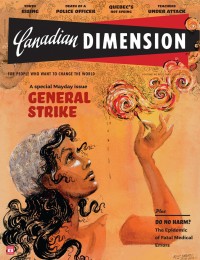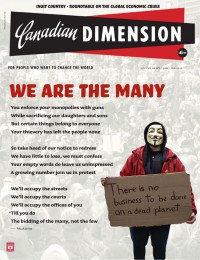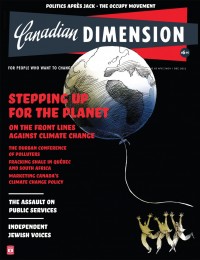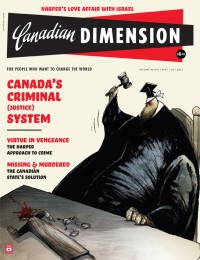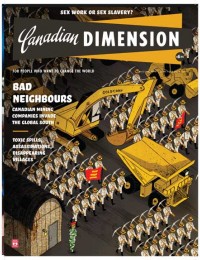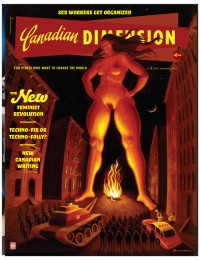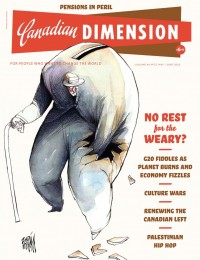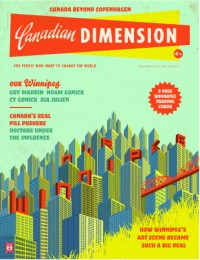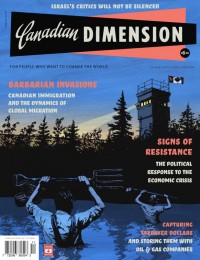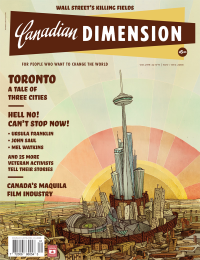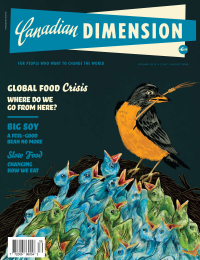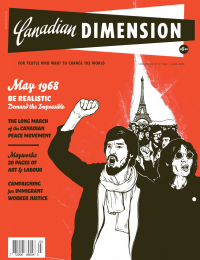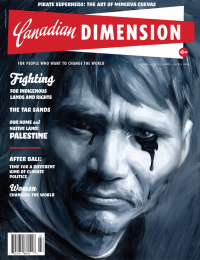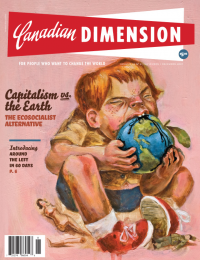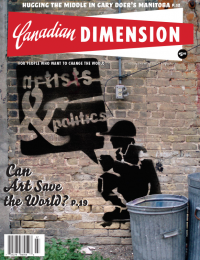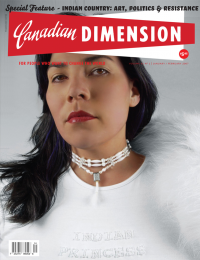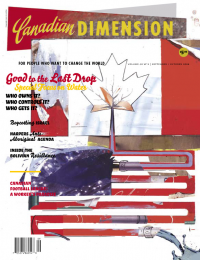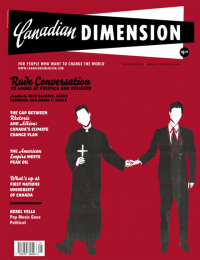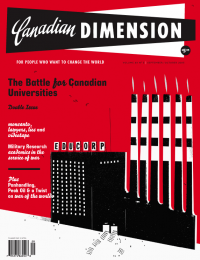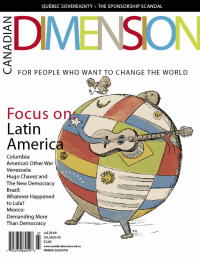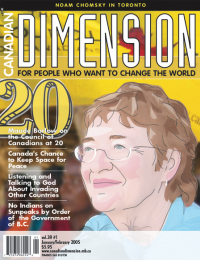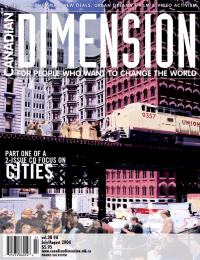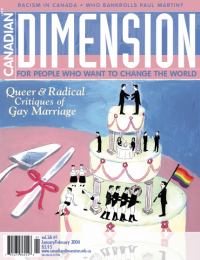Interview with Marxist Geographer Don Mitchell
Don Mitchel is Geography department chair at Syracuse University and director of the People’s Geography Project. He has written extensively on homelessness and public space, how protest is silenced in public space and migrant labour. His book, The Right to The City: Social Justice and the Fight for Public Space, charts the struggle for public space and its connection to social movements in the United States. Concordia Geography graduate Matthew Gore and I had the chance to speak with Mitchel after his lecture in Montreal to mark the 60th anniversary of the University of Montreal’s geography department. Transcription by Matthew Gore

Your talk yesterday was called, “Confessions of a Desk-Bound Radical.” What kind of confessions does a desk-bound radical make?
A lot of people who are politically active as academics spend a fair amount of time worrying about that relationship between activism and academic work and the best way to organize that relationship. And for a lot people, it’s to find ways to be more directly connected with activism. But that’s not my approach, in part because I’m not a good organizer.
What I’m good at is thinking, telling stories, and that kind of stuff. I think there is another approach, which is to think about the division of labour between those who are good at and committed to on-the-ground organizing and those who are paid by society, like professors, who are politically committed and commit their time to politically-oriented research and writing and using that as another wedge to orient politics, working in solidarity with activists perhaps, sometimes being critical of what’s going on as there’s good room and an important need for critical distance. And so I was trying to suggest that one can be politically active and politically committed without necessarily being directly involved with activist-oriented politics, even though one’s orientations might be toward that.
And especially with someone like myself as I’ve moved through the university, starting as an undergrad, then grad student, becoming a faculty member, becoming tenured, becoming an administrator, and now department chair, my time became committed in very different ways, so making it possible for other people to do activist-oriented work and research, and to open up a space for this, like within our department for the community geography research.
What that means for me is that I have far less time to do things that I want to do that is directly engaged because there are only so many hours in the day. And it’s sometimes really hard when there are protests going on or there’s stuff happening that you want to be involved with, at whatever level you’re working with, a lot of my friends work with homeless people and so forth, and you’re sitting there at your computer doing whatever. But I think that that is necessary work.
So to me the question becomes then how do you orient that work, rather than whether you do it or not or whether you worry about whether you’re doing it or not. But how you orient it and taking the time and making the effort to orient your work toward a set of political goals. So for me, with my public space research, it’s about finding ways to open public spaces to that they are less controlled, finding ways so that particularly the most marginalized people like homeless people are not so heavily policed and have a chance to live lives that they actually have some control over. To me, that is an intellectual as well as a political project. I spend a lot of time reading law reviews for example, and thinking about how law works and how policing works, and then trying to critique it, and that is a political position, it’s a political choice, it’s an orientation that I take. I’m very very upfront about it. I think people who work on the other side, there’s this whole group of people who work in think tanks, they think of better ways to police the homeless. They talk about their work as “common sense” rather than as political, but of course it’s deeply political. And I think we need to be very clear and upfront about that.
So I was just trying to spin out that argument, about that role of what that activist/academic is, even when we’re just sitting at a desk or in the library reading. Is all academic work political in some way?
All social science work is. I think absolutely, and probably most humanities. In some ways, it may be quite distanced, the politics might be quite attenuated. There’s research for research’s sake where the links to politics might be very distanced, but then again they may not be. Friends of mine in the chemistry department do really fascinating stuff on polymer chemistry because they get corporate funding for it. There’s greater and lesser distance that they have with all of this.
My wife does research on snowfall in upstate New York among other things, and her work isn’t immediately political. A lot of it is unfunded. It’s not immediately political, but there is an orientation behind it which is thinking about climate change and its effects on the region that we live in, and why it’s important, what it does to our cross-country skiing possibilities. It’s not political in the way that my work is, and she isn’t orienting it in that kind of work. She’s really interested in global circulation, which is changing, she’s interested in how that works out regionally, and what it means in terms of landscapes and how they’re transformed. But behind that, there is a politics to it, but it’s not right at the heart of it. There are greater and lesser degrees in social science as well, but social science is more immediately so because we’re dealing with people’s lives, how we structure society, and how power works through it. Those are the key questions of social sciences, and it’s necessarily political in that regard.
The New Left Review just printed a review of Fredric Jameson’s new book on utopia, Archaeologies of the Future. Academics tend to work in a world of ideas where they might imagine a better place. How does the idea of utopia fit into your research?
I haven’t read Jameson’s book or the review, but behind my work there are very strong utopian visions of the world that I want to live in and what it might look like, how urban space might be organized, how the food that gets on our tables might produced. A lot of my research is on migratory farm workers in California and the agricultural landscape, and the incredibly exploitative way that agribusiness has been set up. So there are a set of utopian visions behind that of what a more just landscape might look like, what a more just city might look like, and what kinds of things we might do to begin getting there. For me, it’s doing the research to expose how these structures work.
But utopia’s a really tricky thing. But what I’ve been deeply influenced by in thinking about utopia is David Harvey’s work. In Spaces of Hope, he has a really nice discussion of the contradictions of utopia, necessity and epidemic contradictions. What I find really helpful is he talks about utopian thinking in two ways. One is the utopia of form, and this is like Thomas Moore’s original Utopia. The term means “no place” by the way. That’s why Moore uses the term. A utopia of spatial form means that if you just get the world set up right, you get the structures in place, you create the landscape in a proper way, then just social relations will follow. The problem with that is that you’ve frozen social relations in a moment of time along with any hidden injustices or whatever power relations there might be etc, people will then always struggle to transform that. So the problem with the utopia of form is that it ossifies a particular moment, and expects it then that there’ll be no history basically. History will come to an end, which it never does.
Harvey talks about a second category which is a more complex notion of utopia, which he calls a utopia of process. Utopia of process is this notion that if you can just get the social relations started in a particular way, then the form will follow, a more just world will follow. And there are plenty of examples. He uses Marx, and Marx is a kind of classic and very ambivalent… If we can reorganize the social relations of the workplace in particular, and in particular ways, then a more just society can begin to develop out of that.
But at the same time, free market ideologies are right there very much a utopia of process. If we just let the market do its work, then a more just world will result, right? And he says the problem with that is that any process always has to touch down on the ground, it has to create some sort of a form, which then freezes that process in a particular way. There’s a landscape that has to be reckoned with. So whatever the market might be doing in this moment in time sets up the set of social relationships that have to then be dealt with.
So both of these are therefore problematic and limited, but both are necessary always to be thinking about and necessary to be struggling for. Reworking landscapes to get more just forms and reworking social relations so you have more just relationships. And then dealing with constantly the real world, and the consequences that result from that. And so the way in which market fundamentalism leads to a set of social relations in the way cities are organized for example then determines how our social relations will unfold after that.
From my reading of Harvey, utopia becomes a very complex notion. It becomes something that is actually impossible. It’s no place. But it’s something that always necessarily needs to be struggled towards. It’s a set of ideas or images or goals that are used to help structure what you’re going to do in the here and now.
How does a desk-bound radical cope with the pressures of the university and the conflicting forces of research and market fundamentalism?
There’s this expectation that universities will be operated like other businesses, but they’re fundamentally different. University administrators are constantly putting pressure on us academics not to waste time, and I think wasting time is incredibly important to any kind of intellectual pursuit. I do my best writing when I’m out on a run or standing in a shower or something like that. It’s not when I’m sitting at my desk answering emails or marking papers, which is also important.
There’s this pressure that our time be used “productively” and that we can show productivity. I actually think that wasting time is incredibly important in these kinds of pursuits and there’s no room to recognize that because the pressures have turned us into these productivity machines through market forces, to be able to show that we are “productive”. And some of that for me is that I play along with the game so I just publish all the time, and part of that is that I’m just compelled to write. But I publish all the time, and then that opens up other opportunities for me. I can do other things and use that against itself by saying, ok, well I’m now a valued member of this institution, people turn to me for things, I have power in this institution, so I’m going to use it, I’m going to use it to make the place where I work the place where I want to work. So that’s why I became department chair. It was really to make our department something else.
There are all kinds of pressures at the university, pressures like to get grants, sometimes to get things like National Science Foundation money, but also to get corporate money for us to do our work. Universities now, I don’t know how it is here in Canada, but particularly in the United States, themselves have to raise huge endowments, and that means that they’ve got to try and get money from every person they can, every foundation, every corporation.
Despite our very progressive administration at the moment, we got this huge grant from the Kauffman Foundation, which is one of the big department store fortunes, but it’s about entrepreneurialship, and it’s about making the “entrepreneurial university.” It’s $10 million or something like that. And so now we all get to be entrepreneurial professors, and they have little grants for us if we’re more entrepreneurial. I have no idea what that means, but this whole language of entrepreneurialism comes in. And they want entrepreneurial students, they want entrepreneurial faculty, they want entrepreneurial janitors, it’s everything. And that’s because they’ve got to chase this money now to be “competitive.” Universities have to be “competitive” now so that whole ideology moves in, whatever that means. And those pressures are huge.
How do you figure within this system, at once critical of the system but then having to work within it?
I use the system’s ideology against itself all the time.
Is that possible?
Yes, part of it is saying I’m more “excellent” than you, to use their terminology. Universities also, as part of their ideology, have got “diversity” and “difference”, political difference and those kinds of things, so ok, I’m politically different, there you go. There’s got to be room for me, and there’s got to be room for what we’re doing in our department.
When I became department chair, I decided that we had one goal in our department, and that was that we were going to be the most intellectually exciting place on campus. That was it. And that’s a big thing also. It’s a very different thing from getting the most grants, or having the most prestige, or anything else like that. And we began orienting our work around that idea, that we were going to be intellectually exciting, and that everything else would follow from that. And it does, and people start paying attention to our department.
But I was also in lots of uncomfortable situations. There was an alumnus of the university who got a masters degree there in the 1960s, and he really liked the geography department. He did cultural geography there, and then he went to UCLA and got a PhD in cartography, and he eventually ended up at Binghamton State University in New York and he made a lot of money consulting with the military, and consulting particularly on object analysis, that’s what it’s called, which is how automated systems can recognize what a barn if it’s on a map. A barn is a very different thing in say Croatia than it is here. How does an automated guided missile recognize a barn or, as I said to him, “how does it recognize the Chinese embassy?” –wasn’t it in Belgrade where the US bombed the Chinese embassy “by mistake” with an outdated map or something?
So he made a lot of money, and he wants to give a big chunk of money, $100,000, to the department to support students. He also wanted, he’s from Taiwan, and he remains utterly, utterly opposed to mainland China regime, whatever changes it has gone through and everything else, he wanted to give money to get Taiwanese students to the come to the university or to get students here to study in Taiwan. This is going to be an endowment that’s going to last forever.
We had a lot of negotiations about how we write this to be broader than that because that’s too small a pool. So I got him to say let’s just say Asia, people doing work in Asia, people come in from Asia. There’s a lot of people to support, and he ended up writing it with naming particular countries. So none of the formerly communist places, and if you’re from Laos Vietnam, or Cambodia, you’re out of luck.
I had to make a decision at some point about whether we would accept this money or not accept this money. It comes from bad sources with restrictions on it, and I decided to, in consultation with the department, and the dean’s office, and various other things because part of it is that I think money really can be laundered and cleaned up in that process. The money comes from that, and it can be used for other things, and we still have the right of which students we give it to, and how we select them, and what kind of research they might be doing. We also need to support more students, and the only way to support more students is if we get more money from outside. It’s the only way we can do it, and so I decided we got to do this, and we’re going to live with the terms of the agreements somehow. You make those tradeoffs all the time.
I did my own project, the People’s Geography Project stuff, with money from the MacArthur Foundation. MacArthur made his money as a business executive mostly in insurance and various other things, but basically the same way as any capitalist money is made, and that’s through exploitation. And yet, it was supporting me trying to do radical stuff. That’s part of how it works and you use it I think.
So there are those kinds of things. You negotiate these. You take a step forward, a couple back, some to the side, and figure out what to do with it, where you can open things up, make some change, and hopefully excite students to think politically, and counteract the power of the business schools because they do all this unabashedly. They can indoctrinate people. We can too.
A lot of your work has dealt with the homelessness, and yesterday you mentioned the “annihilation of the homeless in America.” I remember reading something Bertell Ollman wrote where he compares a liberal’s reaction to homelessness with that a Marxist. He says that when a liberal walks down the street and sees a homeless person, he says, “the system isn’t working.” But when a Marxist walks down the street and sees a homeless person, he says, “the system is working.” What orientation have you taken in your research on homelessness?
I got interested in homelessness from living in San Diego in the 1980s when street homelessness just explodes. And then I came to Penn State for my Masters degree. I actually studied one hundred years of homelessness in Johnstown, Pennsylvania, an old steel town where the mills were shut down in 1983. They went from 12,000 steel workers in 1978 to 2,000 by 1985. It was devastating.. abandoned housing everywhere and people living on the street. And then Johnstown is famous for a whole series of floods, the biggest one in 1889 that left most of the city homeless. When there were strikes, when it was very much a company town in the 1910s and 1920s, people would be kicked out of their houses because they were company houses, so they were living on the street and in tent cities. So there are these very different manifestations of homelessness. I tried to study that and the geographies of control that were part of it.
As I turned to issues of migratory work in California which I’ve looked at historically, one of the things that really marks migratory workers is that they are often without a home. There are connections in all of this and I’ve kept worrying away at questions of homelessness. I got very interested in law and how law works and particularly how anti-homeless laws work, no camping, no sitting on streets, all of those kinds of things, and I started tracing these laws and their rise, and thinking about them as ways of governing public space that… in my argument I actually wrote a piece called, “The Annihilation of Space by Law.” The phrase comes Marx who talks about the annihilation of space by time. I wrote about the annihilation of space by law. What we’re building in cities are spaces in which homeless people have no place to be. They literally have no place to be. They can’t do the kinds of things that one must do in order to live without someone else’s permission. We can all shit and fuck and do anything like that without other people’s permission within the social world’s sense of it. But for someone who is homeless, that’s impossible. They need to have the permission of a shelter owner, or a cop, or a restaurant owner, or whoever else, or they have to live illegally. And so we’re creating illegal cities in which there’s no space to be for some class of people.
There’s a law scholar by the name of Jeremy Waldron who’s written a very very powerful piece called, “Homelessness and the issue of freedom” about this. It’s been very influential for me. So I was tracing how these laws work, and one of the things I’ve tried to do is link to how they’re related to transformations in global capitalism, and how one of the contradictions of Capital, and Harvey is very good about this, is that capital both has to circulate, value has to circulate in order for it to be capital. It has to literally move. But some capital always has to be fixed in place, in buildings, in machinery, in homes, and all these kinds of things, and that’s a contradiction because it becomes, in Marxist terms, “not capital” even if it’s being deployed as capital, it’s not capital for some amount of time, and it’s vulnerable to all kinds of things, collapses of markets, agricultural droughts, and everything else. Within cities, some factions of capital are very much rooted in place, while other factions of capital are incredibly footloose, and it makes for an incredibly insecure urban landscape. One of the responses to the globalized neo-liberalism that we live in now has always been to try and find ways to attract that footloose capital in the form of investment, but also in the form of tourist dollars, suburban residents, new middle-class people downtown, etc. In order to do that, cities feel, and landed capital in cities feel, that they have to create a landscape that’s going to be attractive to upper middle-class people like myself, suburbanites, attractive, safe, whatever that means, fun -now “creative”, people have got to be creative, there’s no one more creative than a homeless person because they learn to live. So there’s all that going on that leads to this incredibly insecure landscape.
One response to that insecurity has been these anti-homeless laws. So it’s illegal to sit on the sidewalk in Seattle, with the cappuccino exception. It’s true. If you buy something from a street vendor, like a coffee or an espresso, then you can actually sit on the streets. And these have all these kinds of effects. In the 1999 protests in Seattle, many, if not most, many of the people who were arrested were not arrested for inciting violence or engaging in violence. They were not arrested for breaking the emergency order that banned protestors but not choppers from downtown. They were arrested for breaking quality of life laws, for sleeping in public, anti-camping ordinance, for sitting on sidewalks, anti-sitting ordinance, and those sort of things. So these laws that are anti-homeless, though it’s never named that, then become the means by which things like protest become policed. I became very interested in this phenomenon and I’ve kept trying to push it through and see what it means for some class of people who have no place to be, see what it means for cities to be built for people like myself rather than for those who don’t have what I have. And absolutely it is part and parcel of how capital works, so Ollman’s absolutely right about this. It’s the system at work.
How do contested ideas of justice figure in your research?
In one of my books, The Right to the City, the title which is stolen from Lefebvre, and the subtitle is, Social Justice and the Fight for Public Space, I’ve really tried to think about this in relation to questions of justice. Within Marxism, justice is highly contested because in part of Marx, there’s this notion that justice is a bourgeois notion. That’s there in Marx. I think the more important issue in Marx is that justice is always contingent. It’s contingent on what counts as justice and as a function of the way we’ve set up the world that we live in. In capitalism, it’s perfectly just for the capitalist to own the fruits of labour because that’s entirely within the system. As a worker, we sell our labour power. We have sold the ability to do work to an owner who now owns that ability, who owns the inputs, the means of production, and the raw materials and therefore owns what comes out on the other side. That’s perfectly just. We might argue about degrees of exploitation, but the basic premise that selling your labour power is just and the fruits of it go to the owner of the means of production is just unquestioned. So there is that contingency of justice, and I think that is really important and something we need to contest and take on. But to me within Marx that notion that justice is contingent within the worlds we live in is important because that suggests then in order to create something more just, we have to transform the social relations, etc, it may only be in small ways, it might be making sure a pantry is open at night for the working poor, which is pretty minor league stuff, but incredibly important, or it might be that a law bans begging on a public street is struck down.
A case in New York in the 1980s where in fact this happened, where the right to beg was upheld by an appellate court, and the lawyer who argued this case on behalf of his homeless clients said, “it’s pretty hard to get excited about getting the right to beg,” but it’s incredibly important. That notion of justice, of the right to beg, on the one hand, is more just because people have no other means of survival, even though I hate being panhandled, it drives me up a wall, I think it’s very important that they have that ability. And to me that’s a step towards a certain kind of justice. It may also help perpetuate an unjust system, and that’s the contradiction that always needs to be worked on and worked through.
So justice is contingent, and it ties back into this notion of utopianism. You always have to ask the question, what would a more just world be? For me, a more just world would be one in which street homelessness does not exist. People want to live without a roof over their heads, fine. But what that means then is a world in which people have a certain level of autonomy within their own lives, a certain level sovereignty over their own bodies, and that becomes a very complex set of issues thinking how that would work, but that’s a starting point as to what a more just world would be. What a just world would be, I have no idea. What constitutes justice in the end, who knows. It’s always something to be struggled toward, rather than… and whatever achievements are made along the way. It’s not something that will ever be finally achieved. It can’t be.
[Question about Marx] Marx began by reading philosophy, and he was interested in some big philosophical questions, reading Hegel, and Kant, and part of it was some of the key questions of the day which were things like, what would a more just world look like, how does ideology work in the world, and so forth, what is the state, which was one of Hegel’s key questions. There are a lot of historians of Marx and Marxism, Marxist scholars, who argue that there was a break in Marx’s work, from the young Marx, to the old Marx, to the older Marx. The young Marx is very philosophical, engaged in philosophical debate, and the older Marx is a political economist, he’s trying to understand how the political capitalist economy works. I think there’s a continuity between them that as he was trying to understand what it is that constitutes the world we live in and how it’s constituted and how a materialist notion of that world, and how people, as he put it famously, make their own histories but not under conditions of their own choosing. He wanted to try to understand what those conditions were. And for him, that meant to turn to the question of everyday existence, everyday survival. How is it that people live, how is it possible to live. And for that he meant, how does capitalism work. What are the barebones social relations of capitalism, and then how is it elaborated into a social system. And so he started reading the political economists and trying to understand what economic social relations were, which if you think about what economics is, it’s about getting a living, making a living. How is it we make life? And it’s a key question of economics, a key question of political economy in particular. His orientation is anti-capitalist, of course, trying to bring into existence a communist society, but his focus in his political economic writing, as well as some of his other writing is what is capitalism, how does capitalism work, what are the structures and logics and social forces of capitalism at large, or modes of production. What’s common between a feudal mode of production and a capitalist mode of production, what’s common and what’s different between then, and what might be possible in terms of some sort of socialist mode of production, what would be common with capitalism, what would be different. But then also at a lower level of abstraction, what is capitalism in the here and now, for him, late 19th century England in particular, which is the leading capitalist industrial society at the time, what are the actual structures in the historical logic of capitalism in the here and now. What does it look like, what are the points of exploitation, struggle, and social reproduction, how people reproduce their daily lives and so forth. And not just what is capitalism in the here and now, but what does it look like in this factory. So a lot of the long chapters in the first volume of Capital on the working day and on modern machinery, which I actually think are fantastic, are great pieces of history, are about specific social relations in specific factories, drawing on the factory reports that came in from particular legal changes in Britain. There’s this amazing social history that he tells, social history of people and machines, of people and long working hours, and why the struggle of the working day is so important, and that’s about the specific kinds of social struggles and specific relations of capitalism which aren’t the same everywhere, but they have particular manifestations in particular locations in particular times. And so he works at all these different levels of abstractions, the very local contingent to the most abstract, things like modes of production and very general questions, and links it up. And this is what Ollman does really well in his book on dialectics and how dialectical investigations work and he shows how Marx links up these different levels of abstractions beautifully. So Marx’s question is basically, what is life, and for him, life is not a question of human nature, although he doesn’t deny that there are things that make us human, but it’s how that whatever it is that makes us human intersects with larger structures, particularly contingent moments, so whatever human nature is with the here and now is something different than it was, feudalism, just as justice is different under feudalism than it is now, (if only late capitalism, late great capitalism) than it was in industrial capitalism in Marx’s time.






